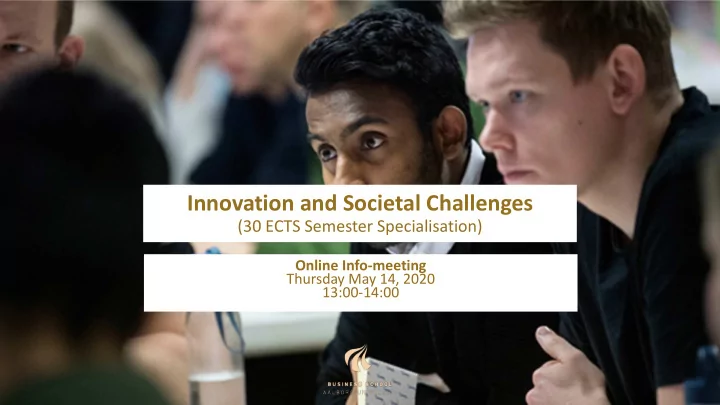

Innovation and Societal Challenges (30 ECTS Semester Specialisation) Online Info-meeting Thursday May 14, 2020 13:00-14:00
• Increased pressure on firms’ strategizing, agility, and innovativeness (health crisis; climate change, pollution, inequality, migration or ageing populations). • All illustrates the huge impact societal challenges may have on firm-level decisions. Why is it • Pressure for adapting to this new business landscape important? stems not only from macro-economic changes and governments, also consumers increasingly demand sustainable products, production processes, and governance structures and –behaviors. • In essence, innovation and entrepreneurial thinking and behavior is key to business management of tomorrow .
• Context: 9th Semester Specialisation (30 ECTS) • Content: You will be provided with theory, concepts and methods to analyse the role of innovation and entrepreneurship in coping with challenges from economic, social and sustainable development. Connecting macro-societal lnnovation trends and agendas with micro-level decision-making in the firm. and Societal Applicability : available for master’s degree students in the following • programmes: • Students enrolled at the Master program in Economics and Business Challenges Administration, Aalborg University, including: International Business, International Marketing, Accounting, Organisation and Strategy. • Students from other AAU master’s programs with a pre-approval from Overview their home study board. • Erasmus+/exchange students (Master level) with a pre-approval from their home university and from the receiving Study Board of Business Administration, AAU. • It is possible to enrol in the whole semester or in single courses (M1- M3). Enrolment in single courses requires pre-approval by the home study board.
Semester structure: MODULE 1: CONTEMPORARY ISSUES IN INNOVATION AND ENTREPRENEURSHIP (5 ECTS) • Coordinators: Eun Kyung Park (Associate Prof.) & Rasmus Lema (Associate Prof.) • 8+ lecturers from IKE (Innovation, Knowledge and Economic dynamics) research group. MODULE 2: ADVANCED INNOVATION MANAGEMENT (10 ECTS) • Professor - Christian Richter Østergaard • Associate Professor - Yariv Taran • Associate Professor - Ina Drejer MODULE 3: SEMESTER PROJECT WITHIN INNOVATION AND SOCIETAL CHALLENGES (15 ECTS) • Supervisors are allocated, so they match project topics and interests, although mainly from the IKE-research group.
Why this module? Because it… Module 1: 1. Brings you the ‘state of the art’ in innovation and entrepreneurship studies Contemporary 2. Links diverse emerging topics within the field Issues in of innovation and entrepreneurship to the Innovation and ongoing societal challenges 3. Is taught by researchers who bring their Entrepreneurship induvial areas of specialisation to the course
The module covers selected contemporary and emerging research topics within innovation and entrepreneurship studies. Module 1: Key topics include: Contemporary • Innovation and societal challenges • From linear model to transformative innovation Issues in • Global innovation networks Innovation and • Financing of innovation and entrepreneurship Entrepreneurship • Sustainable and firm strategy • Innovation and socio-technical transitions • Entrepreneurship and the employment challenge
Lectures by a range of experts from IKE research group Module 1: Contemporary Issues in Innovation and Entrepreneurship
Forms of teaching: Module 1: § Short and succinct lectures (physical and/or online) § Podcast and other online resources Contemporary § Case-based group work Presentation Issues in Peer-feedback and grading Innovation and Entrepreneurship Exam: Individual written exam
Why this module? Because … 1. You will learn knowledge on recent trends in Module 2: innovation management and be able to identify relevant issues and problems in practice Advanced 2. You will be able to critically reflect on and select among theoretical and analytical Innovation approaches for promoting innovation and Management solution models 3. Emphasis is placed on frameworks and methods that are both theoretically sound and practically useful
Key topics include: Introduction to advanced innovation management – what do we need to know § Innovation strategy: Decision Making Under Uncertainty and Complexity § Organising for innovation 1: Absorptive capacity § Module 2: § Sources of innovation: collaboration, networks and user-producer interaction General overview on innovation management studies § Change Management § Service innovation § Advanced Servitization § Innovation Business model innovation and sustainability § Organising for innovation 2: Dynamic Capabilities § Management Evaluating and Selecting Innovation Projects § Disruptive innovation and the innovators dilemma § Organising for innovation 3: The ambidextrous organization § § Profiting from innovation: IPR and complementary assets
Forms of teaching: Module 2: The module contains lectures, online lectures, and exercises § In-class case based exercises § The exercises include § Advanced • discussions of cases • student presentations Innovation with the purpose to engage in a more in depth treatment of some core concepts and challenges within innovation management. Management Exam: Individual oral exam, with point of departure in a written group assignment.
• In the semester project you define and analyse a research problem within the overall theme Innovation Module 3: and societal challenges. • The project can be carried out in collaboration with a company or other external organisation and/or the project may be connected to ongoing interdisciplinary Semester Project mega projects in collaboration with students enrolled in other study programs at master’s level. The project topic within Innovation is defined by the project group and approved by the supervisor. and Societal • Supervision from a broad group of supervisors with Challenges interests and expertise within your topic • Oral internal exam based on the project report, 7-point grading scale
Examples on topics for semester project • How will Covid19 effects X-firm’s future value chain • How to stimulate entrepreneurship? • Innovation in emerging economies • Green investors - passion or rationality? • Sustainable business models transition with point of departure in UN Development Goals (SDGs) • Mega projects within: • The Circular region • Simplifying sustainable living • + new themes in 2020
Time for Q&A
Feel free to contact semester coordinators: Thanks for Yariv Taran: Yariv@business.aau.dk or joining Birgitte Gregersen: bg@business.aau.dk
Recommend
More recommend